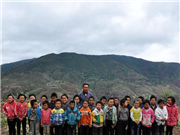

 |
| Members of a Japanese non-governmental organization Murayama Statement Association visit Nanjing Massacre Victims Memorial Hall. (Chinanews/Yang Bo) |
Editor's note: This year marks the 70th anniversary of the victory of World War II and the Chinese People's War of Resistance Against Japanese Aggression. China stands together with the international community in calling for all countries to safeguard international law and justice, protect the postwar order and promote the peaceful development of the world. Neither China nor the international community will allow the history of that terrible conflict to be rewritten.In the following three days,we will publish a series of three commentaries under the theme of "Remembering History and Maintaining Peace."
In 2015, which marks the 70th anniversary of the victory ofthe Chinese People's War of Resistance Against Japanese Aggression, Asian countries that suffered under Japanese expansionism will call for international justice with one voice, demanding Japan take a responsible stance by acknowledging its historical militarism. Early this year, U.S. Ambassador to South Korea Mark Lippert and spokespersons of the U.S. Department of State stated publicly that they hope Japanese Prime Minister Shinzo Abe's cabinet will follow the example of former Japanese Prime Minister Tomiichi Murayama.The former Japanese leadergave a speech on the 50th anniversary of the war's end in 1995, in which he publicly apologized for the atrocities Japanese troopscommitted during World War II.
Today, remembering Murayama's statement from 20 years ago is of special significance for understanding the lessons of World War II.
Since the end of World War II, holding Japan responsible for its aggression and colonial rule has been an important political issue in East Asia. Japan's complicated attitudes toward its history also have a deep influence on regional relations. Through the International Military Tribunal of the Far East (IMTFE), Japanese people became aware of the atrocities committed by the nation's army on Asian battlefields, including the notorious Nanjing Massacre in 1937. Japanese people denounced the crime of militarism, investigated the responsibility for aggression and ultimately decided to take the path of peaceful development.
However, political forces bent on denying historical realities persist in Japan. In the 1980s, right-wing conservatives demanded the reversal of postwar politics amid the country's successful economic development since the end of World War II. In the mid-1990s, the tendency became even more pronounced among Japanese politicians. Over 100 parliamentary politicians established a committee devoted to discussing history. The committee denounced Morihiro Hosokawa, who was elected Japanese Prime Minister in 1993, for his speech apologizing for Japan's aggression. The committee attempted to cover up historical truth and whitewash the past. They attempted to block Japan's parliament from approving a resolution in 1995 that recognized the country's historical responsibility for aggression. Moreover, they pushed politicians to pay respects to war criminals at the Yasukuni Shrine. They denied war atrocities committed by the Japanese army in occupied areas including sex slavery of women from China, Korea and Southeast Asian countries. All these events show that there is a strong political force in Japan obstructing people from reflecting on history even 50 years after the end of World War II.
Will Japan continue bearing the historical burden or make a sincere introspection over its past aggression and acknowledge historical responsibility? This question will decide Japan's future. Murayama became prime minister of Japan in 1994. On August 15, 1995, he stood up against pressure and delivered a formal speech, in which he publicly apologized for Japanese atrocities during World War II.
In his statement, Murayama said: "During a certain period in the not too distant past, Japan, following a mistaken national policy, advanced along the road to war, only to ensnare the Japanese people in a fateful crisis, and, through its colonial rule and aggression, caused tremendous damage and suffering to the people of many countries, particularly to those of Asian nations. In the hope that no such mistake be made in the future, I regard, in a spirit of humility, these irrefutable facts of history, and express here once again my feelings of deep remorse and state my heartfelt apology. Allow me also to express my feelings of profound mourning for all victims, both at home and abroad, of that history."
The speech marked a key moment as Japanese politics stood at a crossroads following World War II. The statement expressed the peaceful voice of an awakened Japanese people. Prime Minister Murayama's words revealed a sharp contrast to short-sighted politicians who even today avoid undertaking historical responsibility and bring instability to East Asia.
The historical legacy of the speech is clear. Murayama's statement promoted relations between Japan and its neighbors, in particular with China and South Korea, and helped Japan earn their trust. The statement also helped Japan mend bilateral ties that had been strained by the irresponsible words and deeds made by some right-wing Japanese politicians. In short, the statement played an important role in maintaining the peace and stability of East Asia.
To thoroughly reflect on the past and advance toward the future, one should have a clear stance on moral issues, as well as maintain trust and foster friendship with concrete actions.
Murayama took a series of measures to promote Japan's ties with its neighbors during his tenure. For example, he announced the "Peace, Friendship, and Exchange Initiative" on August 31, 1994. With the program as a basic framework, Japan and China together supported historical research, and set up Asian Historical Document Center, which later became known as Japan Center for Asian Historical Records, as part of an effort to share historical records and official documents of the Japanese Government. These measures clarified some vague understanding of Japan's historical responsibility and expressed accurate reflections on its past aggression. With these measures, Japan earned the trust of other countries while raising a profound lesson for its own people.
Successive prime ministers after Murayama, despite representing different parties, all followed the principle of their predecessor. Some Japanese leaders have delivered additional speeches regarding historical issues. However, none have matched the weight of Murayama's powerful statement, and their deeds have not lived up to their words.
The lasting influence of Prime Minister Murayama's statement shows that Japanese leaders must thoroughly reflect on the history of Japanese militarism and admit historical responsibility--the only way open for them to lead the country beyond their reprehensible history. Japan's political reputation rests on its ability to take a solemn attitude toward its history, and is also necessary for improving its relations with Asian neighbors and maintaining the stability of East Asia. By undertaking the responsibility of history, regional and world peace, Japan may finally be relieved of its historical burden and embrace a brighter future.
The author is director of the academic board of the Institute of Modern History at the Chinese Academy of Social Sciences.
Day|Week

 Tsinghua junior makes over 10,000 yuan a day by selling alumnae's used quilts
Tsinghua junior makes over 10,000 yuan a day by selling alumnae's used quilts Graduation photos of students from Zhongnan University
Graduation photos of students from Zhongnan University A school with only one teacher in deep mountains
A school with only one teacher in deep mountains Glimpse of cultural heritage "Xilankapu"
Glimpse of cultural heritage "Xilankapu" Homemade cured hams in SW China
Homemade cured hams in SW China Breathtaking buildings of W. Sichuan Plateau
Breathtaking buildings of W. Sichuan Plateau Graduation photos of "legal beauties"
Graduation photos of "legal beauties" Top 10 most expensive restaurants in Beijing in 2015
Top 10 most expensive restaurants in Beijing in 2015